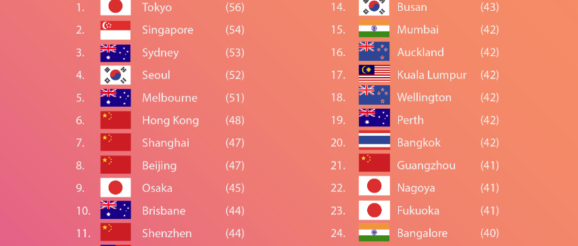Innovation Driving the City | Development Matters

By Ms. Theresa Mathawaphan and Ms. Yaowarat Kekina, National Innovation Agency (Public Organisation), Thailand
Check out the 28 March 2019 EMnet meeting on
“Global Challenges for Business in Emerging Markets”
with a special focus on Smart Cities in Asia
Innovation and technology currently play an increasing role in developing the urban city by tackling multiple challenges. Many cities in the ASEAN region have set-up urban development strategies by creating an innovation ecosystem to elevate the area’s economy and investment, reaching a global level. This makes the “innovation city” concept more recognised and used as a new way of driving the development of cities.
Proof of this is the Innovation Cities Index 2018. This report evaluates the city innovation ecosystem capability of 500 cities worldwide, reflecting the vision that a city can grow and be sustainably driven when citizens and corporations are capable of generating innovation. This index measures three main aspects, namely cultural assets, human infrastructure and networked markets, and has a total of 162 indexes.
Innovation Cities in Asia
The 2018 index revealed good news for some of the world’s top innovation cities: (1) Tokyo, (2) London and (3) San Francisco. Cities in the ASEAN region most prone to becoming an innovative city have built a strong innovation structure, with the presence of innovation areas in different forms, such as innovation corridors, districts or hubs. These areas are open innovation systems that facilitate a high quality of life and innovative business development; they, ultimately, are sources of inspiration for innovation production and thinking for citizens and the private sector. Consequently, this results in sharp economic growth as seen in Singapore, which is the world’s 6th innovative city and the home of the Jurong Innovation District. Similarly, Sydney is the 10th innovative city with its Westmead Innovation District. Hong Kong shows a strong innovation production and development in the Cyberport area, alongside Seoul, Shanghai, Beijing and Bangkok. All these cities incorporated areas of innovation and technology use in their urban planning and development.
Learning from these experiences, Thailand is pursuing what we call an ‘’innovation-driven economy model’’ for development. The model builds connectedness between economies within and outside the country in a form of a network. This will help drive higher revenues in Thailand. Part of this model is “area-based innovation”, which will push for sustainable economic growth, build an innovation ecosystem system that facilitates entrepreneurs, and create a regional cluster for innovative businesses.
Over the past two years, Thailand has formed many partnerships with the public sector, universities, the private sector, and citizens to develop the “Smart City” within the center of each region, such as Khonkaen, Phuket and Chiangmai. For Bangkok, the largest city in Thailand, a distributed network of seven innovation districts was adopted: the Bangkok CyberTech District, the Yothi Medical Innovation District, the Kluaynamthai Innovative Industries District, the Pathumwan Innovation District, the Khlong San Innovation District, the Rattanakosin’s Innovation District and the Latkabung Innovation District. Each district focuses on a different sector, according to respective expertise and characteristics.
The Bangkok CyberTech District, for example, will serve not only as a centre for digital innovation and support the next-generation workforce that is connected and in tune with more digital lifestyles, but also as a comprehensive innovation district offering a complete ecosystem that supports start-ups in Southeast Asia. The area will attract both domestic and international businesses as well as global tech giants to Thailand. Also, it will focus on startups and entrepreneurs on these issues: the Internet of Things (IoT), Big Data Analytics, Artificial Intelligence (AI) and Machine Learning, e-Commerce, Creative Content, Gaming, FinTech, and more.
We are working with a public-private-partnership model to continuously develop the Bangkok CyberTech District. For example, while the private entity Magnolia Quality Development Corporation & True Group is investing about USD 950 million to develop innovation infrastructure, Thailand’s Board of Investment is providing additional privileges and benefits, including an extra year of corporate tax exemption for companies that set up their bases in the Bangkok CyberTech District. And the government’s one-stop service centres will also be established in the district to support corporations and startups and provide a range of services to attract foreign investors to Thailand.
The hub is projected to become home to leading accelerators, incubators, venture capitalists and investors from around the world, initiating programmes and workshops that harness startup businesses while empowering the startup community at the regional level. We are certain that this designated area will be a game-changer for Thailand’s economy and help improve the competitiveness of startups and small- and medium-enterprises, which, in turn, will contribute to Thailand becoming both a technology hub and an innovation society.
Innovation Cities™ Index 2018: Global (2018). Retrieved from 2thinknow: https://www.innovation-cities.com/innovation-cities-index-2018-global/13935/
OECD (2005). Oslo manual: Guidelines for Collecting and Interpreting Innovation Data (3rded.). Paris: OECD Publications.
